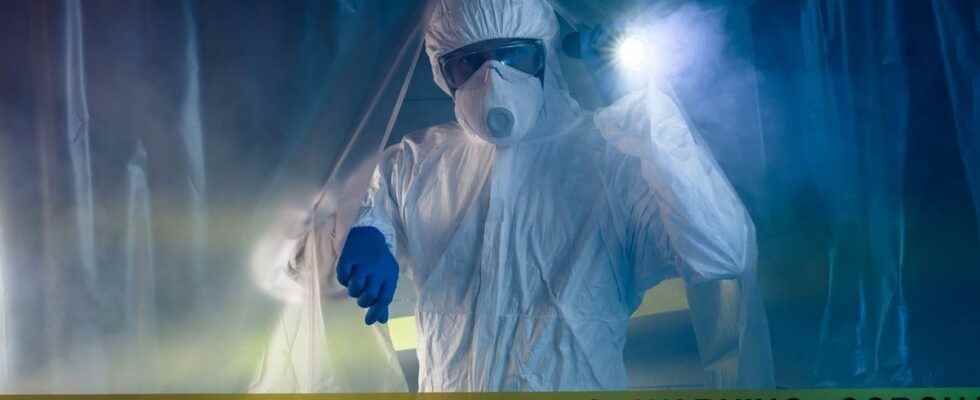Published on
Updated
Reading 3 mins.
in collaboration with
Dr Gérald Kierzek (Medical Director of Doctissimo)
Medical validation:
October 22, 2022
An article in the Daily Mail claims that a “hyper infectious” and particularly “deadly” Covid variant has emerged in the Boston University laboratory. What should we think ? Let’s take stock with Dr. Kierzek.
This is disturbing news to say the least. According to the Daily Mail, scientists from the Boston laboratory have created a brand new strain of Covid… fatal in 80% of cases.
A strain that “kills the infected host in 80% of cases”
This hybrid virus created from scratch – composed of the Omicron variant and the original Wuhan strain – would have a specificity: it would contain a version of the “Spike protein” (the key that allows Covid-19 to enter our cells) which would make it particularly dangerous.
And for good reason: the strain would have a “mortality rate of 80%”, warns the Daily Mail in its article dated October 17. The media claims that eight out of 10 mice infected with the strain created in the laboratory died in the laboratory of Boston University
The researchers’ objective is simple, according to the British daily: to create the virus “most infectious of all time“.
A news, which worries many experts.
“This should be totally forbidden, to do this is to play with the fence.u,” said Professor Shmuel Shapira, a leading scientist in the Israeli government.
Internet users fear the appearance of a “new global pandemic”, or, even worse, the creation of “a biological weapon”.
BU is refuting a series of false media claims about research at its National Emerging Infectious Diseases Laboratories. In a statement, the University called the reporting “false and inaccurate.”
Details ⬇️https://t.co/8H0lvoQgkB
— Boston University (@BU_Tweets) October 18, 2022
No lethal variant would have been created
But what is it really? According to information released by Boston University, no deadly variant has been created by scientists.
In fact, their research – the process and results of which are available online – was aimed solely at comparing the Spike protein of the Omicron variant to that of the original strain of the virus discovered in Wuhan.
Faced with these accusations, Boston University violently disputed all the information relayed by the Daily Mail, calling the article “false and inaccurate“. For Ronald Corley, director of the NEIDL, these false statements “taken out of context for the purpose of sensationalism “misrepresent”not only the results of the study, but also its objectives“.
As proof, the research was conducted on animal models (mice) very sensitive to the Covid virus. Thus, the 80% highlighted does not make sense because the article does not mention that the original Wuhan strain with which the university researchers began their work killed 100% of the infected mice!
Fundamental research whose results have been diverted
In fact, according to Boston University’s statement, “this research mirrors and reinforces the findings of other similar research conducted by other organizations, including the FDA“.
“Consistent with studies published by others, this work shows that it is not the spike protein that drives the pathogenicity of Omicron, but rather other viral proteins.“, says Saeed, assistant professor of biochemistry at BU Chobanian & Avedisian School of Medicine.”Determining these proteins will lead to better diagnostics and disease management strategies“.
Despite this denial, the story still bounces with a STAT News article who reports that the research had not been properly approved by US health authorities. This is refuted again by Boston University, which claims that their scientists have followed all the guidelines and protocols of the National Institute of Allergy and Infectious Diseases (NIAID).
The units in which the researchers work are among the 13 biosafety level 4 laboratories in the United States. By level 4 laboratory, we mean all high-security structures exclusively dedicated to research on class 4 pathogens (Covid, Ebola, etc.). In fact, the researchers carry out all the experiments in a closed, ventilated and secure work space.
A constant shared by Dr. Kierzek.
“Carrying out virological tests, manipulations on viruses is something common, which makes it possible to advance research. The interest is to highlight the pathogenic mechanisms in animals in order to find new therapeutic routes. Another important detail: what happens in P4 secure laboratories stays inside. Viruses cannot escape.”
